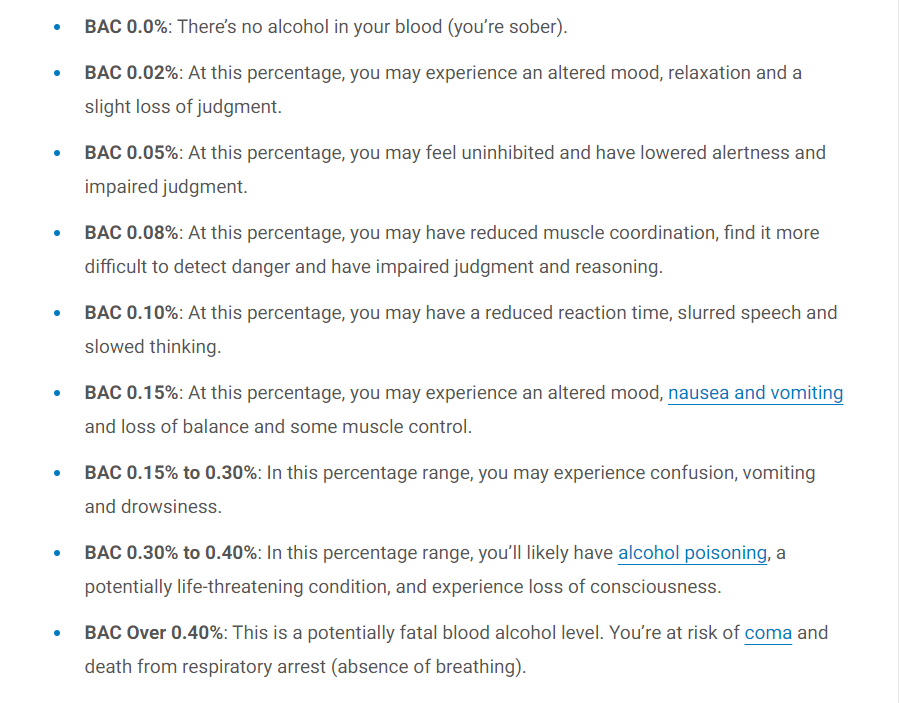Blood Alcohol Content vs. Breath Alcohol Content (BAC vs. BrAC) – What’s the Difference?
Blood alcohol content (BAC) and breath alcohol content (BrAC) are two manners of determining how much alcohol is in a person’s system. BAC measures how much alcohol is in a person’s bloodstream, while BrAC measures how much is in their breath.
Blood Alcohol Content (BAC)
When a person drinks an alcoholic beverage of any sort, the alcohol is absorbed by the stomach and small intestines before entering the bloodstream. Once there, it is actively metabolized by the liver until it completely filters out of the body.
Drinking adult beverages faster than the liver can metabolize the alcohol causes a greater level of intoxication which, in turn, affects the person’s BAC level. In addition to the rate of drinking, BAC can also be affected by the type of alcohol being consumed, the size of the person drinking, and the amount of food or water the person has recently had.
According to the Cleveland Clinic, BAC affects individuals based on the following levels:


In Arizona, a person can be pulled over and asked to perform a sobriety test by law enforcement for impairment of even the slightest degree. An individual can be convicted of a DUI if found to be impaired to the slightest degree due to drugs or alcohol or with a BAC of .08 or above.
A BAC of as low as .02 can cause minor judgement loss with additional impaired judgement by .05.
Blood tests are the most accurate method of determining BAC. Urine samples may also be tested, but these results can be less accurate. Some agencies may also use breathalyzer tests to determine BAC, however these also can be less accurate, as they convert breath alcohol content (see below) into blood alcohol content.
Breath Alcohol Content (BrAC)
When the alcohol a person drinks is processed into their bloodstream, some of this blood naturally passes through the lungs as part of the body’s normal circulatory process. The alcohol in this blood evaporates through the lungs’ alveoli, ultimately exiting through the person’s mouth as they breathe.
Breath alcohol content (BrAC) measures how much alcohol enters the air when a person exhales and can be determined using a breathalyzer test or the use of an ignition interlock device (vehicle breathalyzers).
Typically, a person’s BAC level is 2100 times higher than their BrAC level, with the accepted ratio of breath alcohol content to blood alcohol content assumed to be 2100:1.
BrAC results can be obtained more easily and inexpensively than BAC levels, making breathalyzer tests popular among law enforcement in suspected DUI cases. However, they are not as accurate as blood tests that provide exact BAC levels. Breathalyzer tests, and therefore BrAC levels, can be affected by incorrectly calibrated measuring devices, breath-to-blood ratio, and various external factors.
For this reason, many defense attorneys recommend declining roadside breathalyzer tests in favor of consenting to a later blood test at the police station. While anyone brought in to test at a police station is required to undergo BAC testing, there is no requirement to complete roadside sobriety tests. Portable roadside breathalyzers are scientifically unreliable and the results are not admissible as evidence in court.
RIDEOUT LAW GROUP
With offices in Lake Havasu City and Scottsdale, our firm serves the entire state of Arizona, with a particular focus on criminal defense, family law, and juvenile cases.
Our goal is for the best outcome for your criminal case, which can include:
- charges that are reduced or dropped.
- top experts reviewing your case.
- aggressive negotiations with the prosecution for plea bargains.
- fines or probation in lieu of jail time.
At Rideout Law Group, our attorneys are able to expertly examine the evidence in your case to provide a strong strategy for argument that leads to an outcome that is most favorable to you. We have experience in all types of criminal cases for both adults and juveniles, with positive outcomes both in plea negotiations as well as jury trial settings.
Call us today for a free consultation at 480-584-3328.
